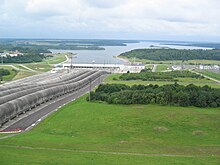Renewable energy in Lithuania
 From Wikipedia the free encyclopedia
From Wikipedia the free encyclopedia



Renewable energy in Lithuania constitutes a growing source of energy in the country.
In 2023, renewable energy sources accounted for 76.4% of electricity generation in the country, up from 18.2% in 2010 and 1.4% in 1990.[1]
Statistics
[edit]Renewable energy in Lithuania by type (as of 2022):[2]
Biomass
[edit]Solid biofuel or biomass represents the most common source of renewable energy in Lithuania.[2] Most commonly used are firewood and wood as well as agricultural waste.[2] It is primarily used to produce heat, but is also used for electricity production.[2]
Biofuel
[edit]
| Biofuels[3] | ||||||||
|---|---|---|---|---|---|---|---|---|
| Consumption 2005 (GWh) | Consumption 2006 (GWh) | Consumption 2007 (GWh) | ||||||
| Total | Total | Biodiesel | Bioethanol | Total | Biodiesel | Bioethanol | ||
| 97 | 226 | 162 | 64 | 612 | 477 | 135 | ||
Biogas
[edit]| Year | 2009 | 2010 | 2011 |
|---|---|---|---|
| Capacity (million m3) | 9.8 | 20.9 | 23.2 |
Hydroelectricity
[edit]
- Kruonis Pumped Storage Plant, its main purpose is to provide a spinning reserve of the power system, to regulate the load curve of the power system 24 hours a day. Installed capacity of the pumped storage plant: 900 MW (4 units, 225 MW each).
- Kaunas Hydroelectric Power Plant, has a capacity of 100.8 MW.[4]
Geothermal energy
[edit]- Klaipėda Geothermal Demonstration Plant, the first geothermal heating plant in the Baltic Sea region.[5]
Solar power
[edit]
In 2023, Lithuania had capacity of 1165 MW of solar power (compared to only 2.4 MWh power in 2010).[6][7]
As of 2012, Lithuania has 1,580 small (from several kilowatts to 2,500 kW) solar power plants with a total installed capacity of 59.4 MW which produce electricity for the country, and has an uncounted number of private power plants which make electricity only for their owners.[8]
Wind power
[edit]Installed wind power capacity in Lithuania and generation in recent years is shown in the table below:[9][10][11][12][13][14][15][16][17]
| Year | 1998-2003 | 2004 | 2005 | 2006 | 2007 | 2008 | 2009 | 2010 | 2011 | 2012 | 2013 | 2014 | 2015 | 2016 | 2017 | 2018 | 2019 | 2020 | 2021 | 2022 | 2023 |
|---|---|---|---|---|---|---|---|---|---|---|---|---|---|---|---|---|---|---|---|---|---|
| Capacity (MW) | 0 | 6 | 6 | 48 | 51 | 54 | 91 | 133 | 202 | 275 | 279 | 288 | 436 | 509 | 518 | 533 | 534 | 671 | 671 | 946 | 1287 |
See also
[edit]References
[edit]- ^ "Share of electricity production from renewables - Lithuania". Our World in Data. 20 June 2024. Retrieved 27 December 2024.
- ^ a b c d "Environment, Agriculture and Energy in Lithuania (edition 2023)". Statistics Lithuania. Retrieved 10 September 2023.
- ^ Biofuels barometer 2007 – EurObserv’ER Systèmes solaires Le journal des énergies renouvelables n° 179, s. 63–75, 5/2007
- ^ "Kauno Algirdo Brazausko hidroelektrinė". 15min. Archived from the original on 24 March 2023. Retrieved 9 September 2023.
- ^ "Implementation Completion Report". The World Bank. 2005. p. 4. Retrieved 4 May 2008.
- ^ https://www.developmentaid.org/api/frontend/cms/file/2024/03/IRENA_RE_Capacity_Statistics_2024.pdf [bare URL PDF]
- ^ "Energetikos statistika 2010 m. keitėsi šalies kuro ir energijos sąnaudų struktūra" (in Lithuanian). stat.gov.lt. 5 June 2011. Archived from the original on 7 April 2012. Retrieved 10 June 2012.
- ^ "Suvilioti dosnių išmokų puolė statyti saulės jėgaines" (in Lithuanian). delfi.lt. 4 June 2012. Retrieved 10 June 2012.
- ^ "Wind in power - 2009 European statistics" (PDF). ewea.org. February 2010. Retrieved 6 June 2012.
- ^ "Wind in power - 2010 European statistics" (PDF). ewea.org. February 2011. Retrieved 6 June 2012.
- ^ "Wind in power - 2011 European statistics" (PDF). ewea.org. February 2012. Retrieved 6 June 2012.
- ^ "Wind in power in Europe 1998-2009" (XLS). ewea.org. February 2009. Retrieved 6 June 2012.
- ^ http://www.ewea.org/fileadmin/files/library/publications/statistics/Wind_in_power_annual_statistics_2012.pdf [bare URL PDF]
- ^ "Vėjo energetika Lietuvoje".
- ^ https://www.irena.org/-/media/Files/IRENA/Agency/Publication/2020/Mar/IRENA_RE_Capacity_Statistics_2020.pdf [bare URL PDF]
- ^ https://www.developmentaid.org/api/frontend/cms/file/2023/03/IRENA_RE_Capacity_Statistics_2023.pdf [bare URL PDF]
- ^ https://www.developmentaid.org/api/frontend/cms/file/2024/03/IRENA_RE_Capacity_Statistics_2024.pdf [bare URL PDF]
External links
[edit]![]() Media related to Renewable energy in Lithuania at Wikimedia Commons
Media related to Renewable energy in Lithuania at Wikimedia Commons